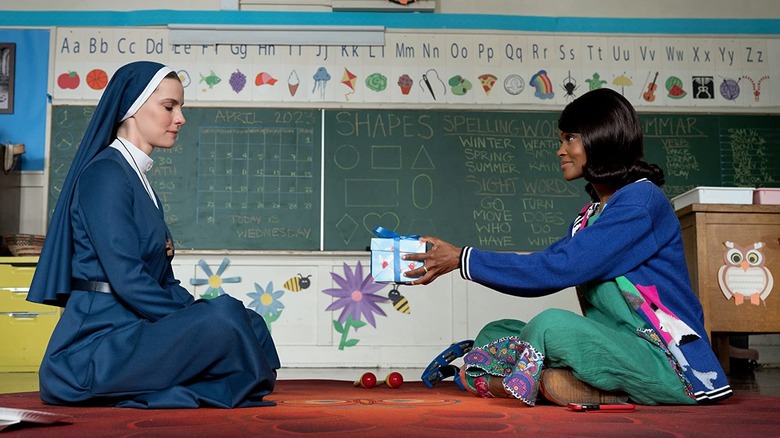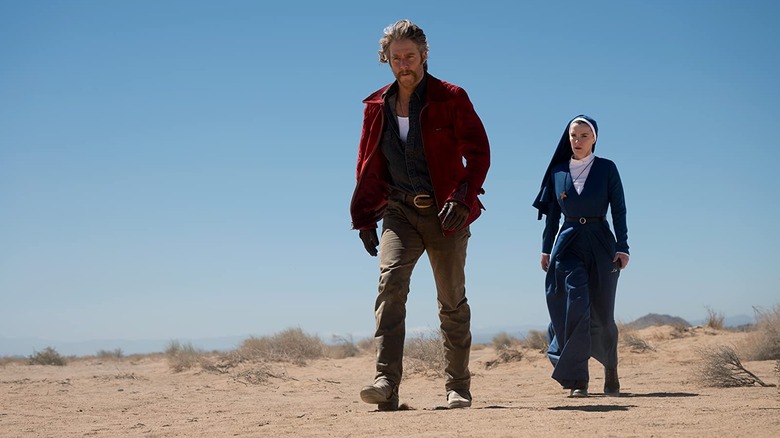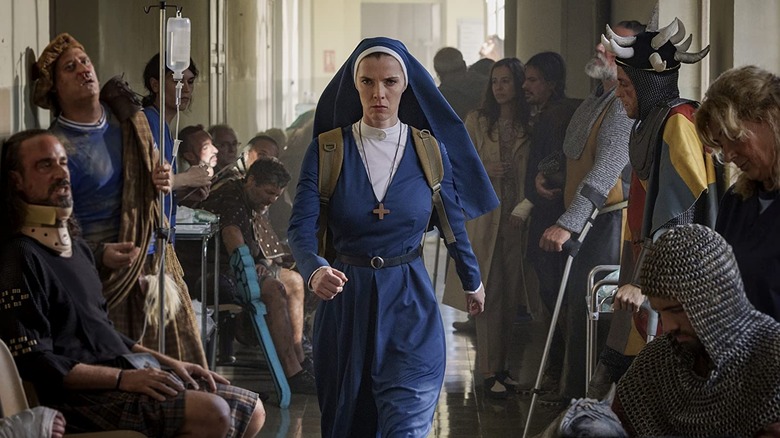Damon Lindelof Wanted Mrs. Davis To Confuse Audiences Before Really Falling Into Place
Watching the first few episodes of "Mrs. Davis," you may find yourself wondering, "Is this show even about anything?" And not in a bad way either, as counterintuitive as that might feel.
Forget dipping one toe into the pool at a time; creators Tara Hernandez and Damon Lindelof plunge you head-first into the show's bizarre sci-fi setting. Its pilot merrily skips from a baffling prologue — itself like a Ridley Scott historical epic inexplicably filled with the cartoonish gore of a Monty Python skit — to sub-plots involving a castaway (and his cat) on an island, jam-making nuns, civilians governed by a seemingly omniscient AI (the titular Mrs. Davis, as she it is known in the U.S.), and German soldiers who feel lifted out of "The Big Lebowski."
There's "a messiness by design inherent" to the series early on, as /Film's Jacob Hall put it. Yet, by the time you reach the end of the first four episodes (which Peacock premiered at the same time, and for a valid reason), a design begins to emerge. The show's themes about technology, religion, and free will start coming into focus, as do the true motivations for our protagonists, Simone/Lizzie (Betty Gilpin) and Wiley (Jake McDorman). None of this is by accident, according to Hernandez.
"This is a mythology-dense series, all with very careful crafting and utilizing the talents of our amazing writers' room," she told Collider. Adding to her comments, Lindelof said they actually wanted audiences to be confused at first, feeling this would be the key to reeling them in.
A hunger for the unexpected
For all its mystifying twists and turns, the "Mrs. Davis" pilot is quick to establish what Simone and Wiley are like, personality-wise, in the present day. The second and third episodes then proceed to build on that foundation, flashing back to the former lovers' childhoods and the events that led to them parting ways in the first place. "But certainly when crafting a pilot, it has to be character-focused," reasoned Tara Hernandez. She went on to praise Betty Gilpin's performance as Simone/Lizzie, stating:
"She has to be a competent leader and guide the audience and say, 'I know this is crazy, but follow me. It's gonna be okay. Get on the bike, or get on the horse.' That allowed us to be really brave and really audacious, at times, and outrageous, and really go for it. Those are just the things we like. We like content that goes for it and is zany and over the top. It was also a bit of just satisfying our own creative desires."
"I think there's a real hunger for the unexpected," added Damon Lindelof, noting he's "just as guilty" as anyone of claiming he wants more original stories while gravitating to "preexisting IP, or things that we're already familiar with." Indeed, much of his previous work has been directly based on something that already exists, be it a novel, a comic book, a franchise, or, in the case of "Tomorrowland," a theme park land. At the same time, no one could fairly accuse Lindelof of playing things safe with projects like "Prometheus" or HBO's "Watchmen" series. If anything, it would seem that being untethered to a beloved IP made him all the more willing to throw caution to the wind on "Mrs. Davis."
'People can actually be a little bit lost'
"A new show, as we're figuring out how to write it by gut, is teaching you how to do so. The only way to know where the line is is to step over it," Damon Lindelof explained. It's why he didn't fret about audiences being disoriented at the beginning of "Mrs. Davis":
"The kind of storytelling that really intrigues us is storytelling where you're a bit confused at first, and then everything starts to fall into place. We really believe that the collective intelligence of the audience is much higher than a lot of television sometimes thinks it is. People can actually be a little bit lost, as long as you have strong central performances, a little bit of humor, and something pulling them through. The idea of the first episode ending and you maybe having no idea what just happened, by the end of the second episode, the show starts to flip from its first four episodes, which are really about creating mystery, into the last four episodes, which are about resolving mystery. If you can get to the top of the mountain, you're gonna have a really fun ride down the other side."
There's truth to this. If you can power through the moments that play like weirdness for its own sake (or, better yet, appreciate them), you may just find that "Mrs. Davis" is saying something profound about faith and who we put our trust in. It's a message that applies just as much to the people who make the art that we engage with on a regular basis, which adds a whole meta-layer of meaning to the show's bizarro narrative. Surely, Lindelof and Tara Hernandez would approve of such an interpretation.
"Mrs. Davis" is streaming on Peacock.


